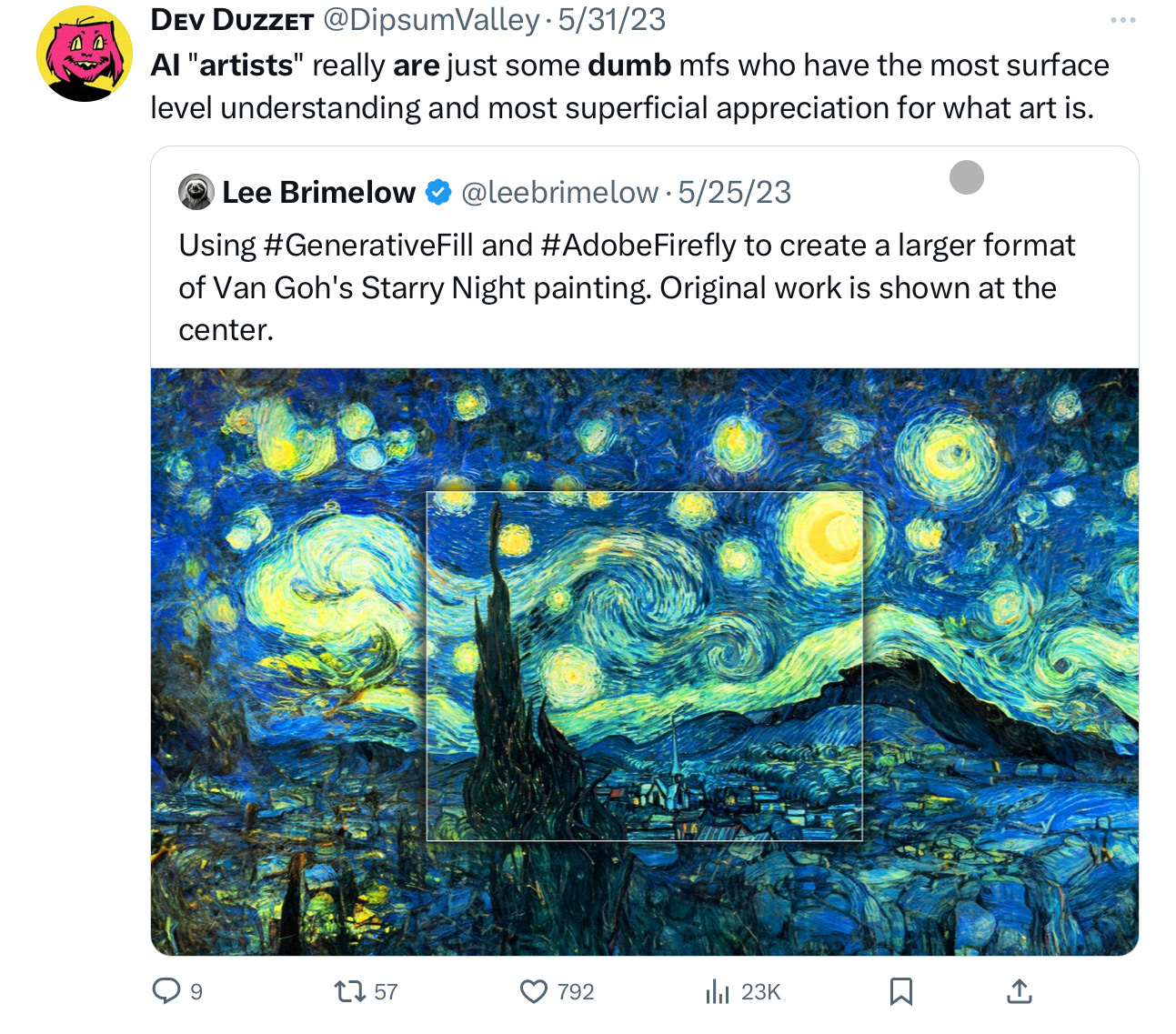Disentangling AI from the Web of Societal Issues
How to Solve Internet Pollution
People have created trash on the Internet since there was an Internet. It has gotten worse as creation and dissemination becomes easier. Social media has already removed many barriers to dissemination, and now Artificial Intelligence is removing many, if not all, of the barriers to creation. Today, the World Wide Web is inundated with uncurated, duplicated, utterly unsophisticated, and, in some cases, wholly fabricated drivel. Everybody knows that, so here's the kicker: Artificial Intelligence is not to blame. In fact, whether AI exists or not has nothing to do with it. There is a deeper societal issue tied to how we value content and creativity.
AI could have exacerbated the situation, sure, but I'd instead examine the underlying cause of the problem. So, before you jump online to yell at a 20-something-year-old because they made $10 last month selling AI-generated prints, simply ask yourself--Why is there a drive to create content quickly and effortlessly? Why are we rushing through or altogether skipping over the creative process? I know people out there will say it is because so-called "prompt engineers" are entitled, lazy, or stupid. I know that because I've seen it. I've seen the TikTok. Tik Tokers, Tweeters, and Instagramers riddle their arguments against AI with personal insults and vows for revenge. Their arguments reek of ego and meritocracy. It's the same shit we've seen time and time again to a different tune.
Listen, no one is using AI because they are lazy. They don't lack ambition or creativity. The narrative that those who work hard and smart will get rich and those who don't, or just won't, will stay poor is deeply flawed. This perception fuels the machine-like production of content, contributing to the pollution we're experiencing online.
Our educational system, which fosters ruthless competition and labels anyone who can't compete as worthless, is part of the problem. We've misguidedly built a meritocracy that excludes those who don't fit the mold. Intelligence, creativity, stability, and technical expertise are all currencies in a system trying to make workers out of children. They lead to financial and social benefits in and out of school. This needs to change. Our worth should not be measured by our skills, but by our humanity.
We've transformed innate human behaviors, like art and writing, into commodities. So, is it any surprise that these commodities are desirable? And that those who have more of it will be envied by those who don't? And that, eventually, it might be stolen? Like wealth. Artists might say art has no social or economic value. So why is anyone trying to steal it?
"Who is there, among those called smart, who does not spend his time amassing loot for a bigger robber than himself?" -The Way of Chuang Tzu, Translation by Thomas Merton "Cracking the Safe"
The Internet has sold creativity and artistry as a profitable side hustle and skill contributing to other side hustles. It represents self-employment to some people, freedom from the 9 to 5.
"Prompt Engineers" don't want to be artists or writers, and they don't want to harm anyone. They want control, and they want to escape, just like you do. They yearn for freedom, understanding that pursuing wealth in late-stage capitalism comes with dissatisfaction and stress. Hard work through traditional means gains very little of anything. Hence, people seek to automate tasks by means that are accessible to them.
Automation and algorithms are the purviews of large companies with lots of money. They automate, they delegate, and the ones that benefit the most do very little of the work. Just last week, I finished a complex and time-consuming project. My boss popped in for a moment to say, "Where are we on that project? Did we meet the deadline?" and "Good work, team!" That's why he gets paid the big bucks. Supervisory roles are our ideal for success and power. They do very little actual work but shoulder most of the responsibility and risk. They carry all the financial burden, owning the tools and means of production.
The beauty of automation right now is that it is accessible to the average person. They feel a sense of ownership over their tools and can do the work of 20 with minimal effort. It is actually amazing and liberating to be out of a system where they would generally be "the worker" and in one where they are the manager. It's a shame so many people hate it and a shame that so many people abuse it. The abuse will increase too; once businesses that offer AI products get their claws into their customers, they will increase their costs and decrease their benefits--Corey Doctorow calls it "Enshittification." Eventually, the average person will reap very few of the advantages that come with it.
What we really need is a paradigm shift. We should reimagine our values and incentivize people to live, create, and express themselves independently of financial concerns. We should recognize the complexity and dignity of human life beyond competition and merit. In essence, by paying people to be human, we could resolve this crisis.
The truth is that if people were not so preoccupied with money or making it big, the Internet would be significantly less cluttered, and art would be a thing humans do, not machines.
If you enjoyed this article tell me so – I want to know if I am moving in the right direction. You can support me by taking the time to read my articles and subscribing. Thank you!
Cory Scott Shaw





